What Effect Does Rain Have on The Water in My Swimming Pool?
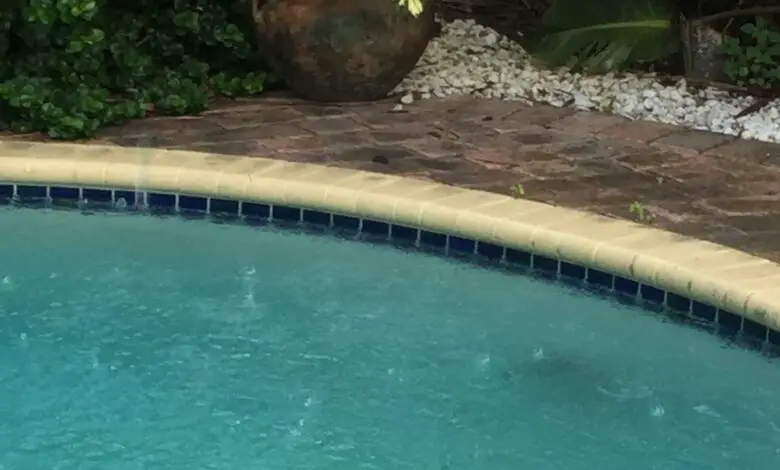
The list of things that can affect your pool’s chemistry levels is long. Rain is one of those external factors that we cannot control, and it can cause pool water imbalances in various ways. Throughout this article, we’ll explain how rainwater can cause issues in your pool.
Rain, is it really that bad for my pool water?
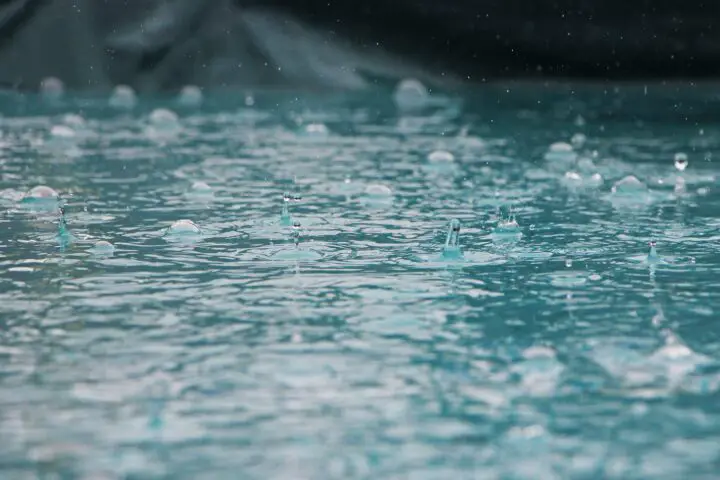
Unless there is a heavy downpour, it’s unlikely that rain will have much of an effect on your pool water, as light showers are not going to dilute your pool chemical levels. Significant disruptions are more caused by the nasties that the rain brings with it. Heavy metals in the air and clouds can make their way into your perth pools when it rains. Pollution is notorious for carrying microbiological organisms such as bacteria and algae spores, and as the rain falls through the air, it can pick up these contaminants and transport them to your pool. Often when it rains, wind accompanies it and these two combined cause leaves, dirt, and other debris to fall into your pool. If they are not removed promptly, they will start throwing out your pool’s chemistry levels.
How does rain affect my pool chemistry levels?
There are various ways rain can affect your pool chemistry levels. Here a few of them:
Chlorine is unable to work
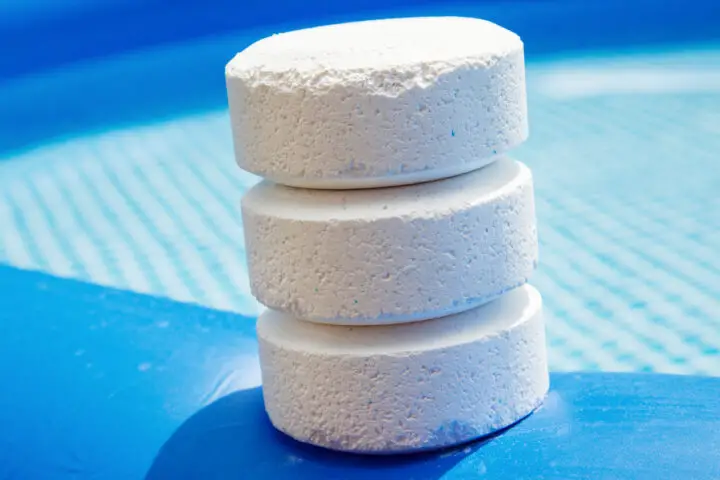
When your pool contains an unhealthy number of contaminants, the chlorine in your pool cannot sanitise the water properly. This is because chlorine binds to the contaminants, and it becomes ineffective. To explain, the chlorine added to your pool is called free chlorine, and this is the good chlorine that kills harmful pathogens to keep the water sanitary, when the free chlorine binds to the contaminants, it becomes combined chlorine or chloramines as they are commonly known. This is bad chlorine, and once it’s in this state, it will do nothing to clean your pool.
Decomposition of organic matter occurs
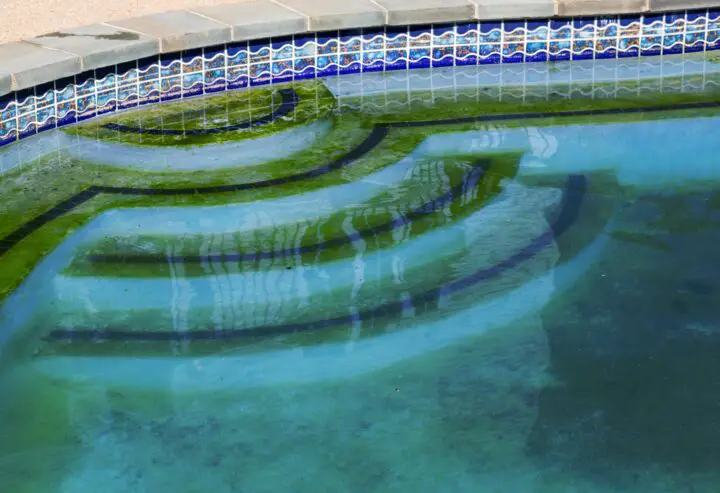
Dirt and other organic matter that has fallen into the water will inevitably sink to the bottom of your pool and start decomposing. When this happens, it creates phosphates which encourage algae growth. It’s likely your pH levels are imbalanced at this point, and it won’t be long before your pool starts to go green.
Your circulation system is compromised
Your pool’s circulation system is the main component when it comes to keeping your pool water clean. If it is not working properly, you may see issues with your pool water. When there is a lot of rain, the pool can fill up with water. When the pool is too full, the skimmers door cannot open and close properly, and debris suctioned into the skimmer will not stay in there, it will float out back into the pool. When debris isn’t removed or contained in the skimmer basket, it will sink to the bottom and start breaking down.
What to do when your pool is overflowing
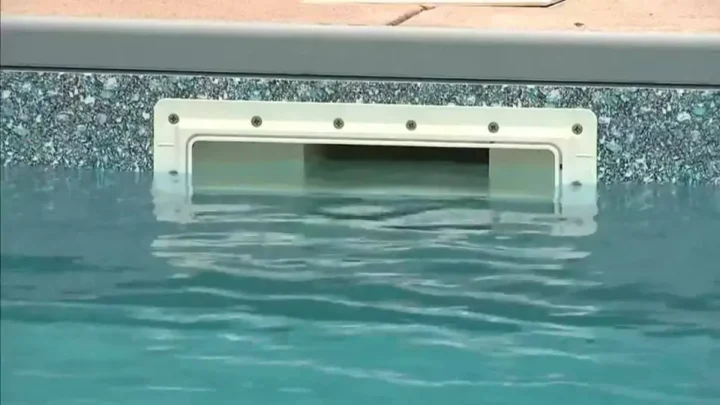
This is a common occurrence in the rainy season, and as a pool owner, you should know how to do this, even if you have a pool cleaner. When rain is constant and heavy, the water can overflow out of your pool and onto everything around it. If you have poor drainage, this can cause flooding. Here’s how to lower the water in your pool:
- Turn the pump off.
- Rotate the multi-port handle to the waste setting.
- Open valves (if any) on the waste line.
- Go over to your pool and open the skimmer lid.
- Remove the skimmer plate if there is one attached.
- Go back to the pump and turn it back on
- The water will now start receding. Leave it on this setting until the water returns to the normal level.
- Turn the pump off again, return the lever to the filter setting.
- If you have a skimmer plate, put it back into position.
- Switch the pump on again.
I’ve lowered to pool water too much, is it ok to leave it?
It’s best to top your pool back up if you’ve lowered it too much, as it can prevent your pool equipment from working adequately.
The steps you should follow after considerable rainfall
Taking swift action after heavy rain will prevent your pool water quality from being affected drastically.
Remove debris
Firstly, you’ll want to remove as much debris and leaves from the pool as you can with your pool scoop. To pick up smaller particles, run your pool cleaner. Empty the contents of your skimmer basket.
Test chemistry levels
Your pool chemistry levels are likely unbalanced after a considerable downpour, and to see what needs readjusting, you’ll need to test the water. You can take a sample to a pool shop for testing or you can do it yourself with a water testing kit.
Here are some chemicals that can be affected by rain and what the optimal levels are for each
Chlorine – Your chlorine levels should be between 1-3ppm.
Ph – Aim for pH levels between 7.4 to 7.6.
Total Alkalinity – TA of between 80-120 ppm is desirable.
Calcium Hardness – CA ranges should be anything from 100-300 ppm.
Total dissolved solids – TDS levels of 1500ppm to 3000ppm are optimal.
How to clean up a green pool
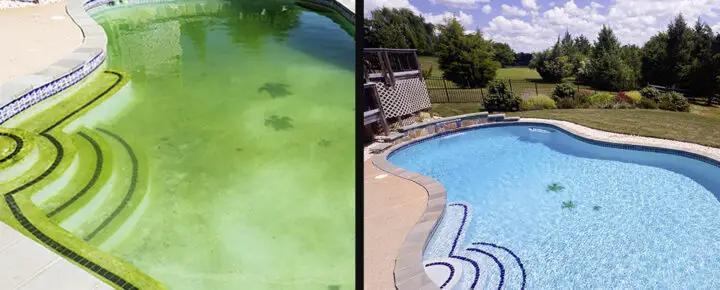
When contaminants are left to their own devices in a pool, it’s common for algae to overtake and the pool to go green. This occurs even faster when the weather is warm. To bring your pool back to its former glory, you’ll need to shock it. If you’ve never heard of the term ‘pool shock’, it’s essentially adding a high dose of chlorine to the pool to kill the bacteria and algae in the water. While chlorine is a strong sanitising agent, it’s not going to be able to clean the pool on its own. You’ll need to add a clarifier, algaecide, and oxidiser too. It’s a good idea to add the chemicals to the water at night-time to prevent the sun from breaking down the chlorine. Run your pump overnight to ensure the chemicals are completely distributed throughout the pool water.
How to clean up a brown pool
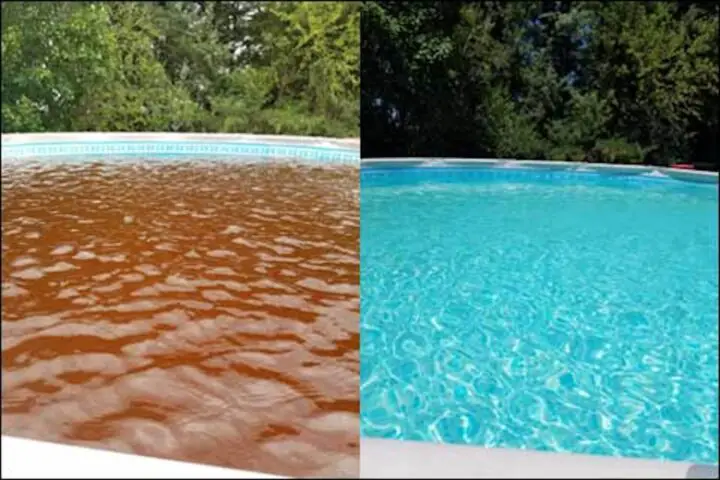
Pools will often go brown after excessive rain. The brown colour is typically caused by dirt. When rain is continuous, the ground gets completely drenched, and the water doesn’t soak in like it normally would, rather it pools on top of the ground. This dirt, mud and debris-laden water then spills into the pool. To fix it, you’ll need to add a flocking agent to the water. It works by attaching to the particles and sinking them to the bottom of the pool. Your pool cleaner can then pick them up much easier than when they are mixed through the water.
We hope this post has given you an idea of the effects rain has on your pool, and as they say, prevention is better than a cure. One of the simplest ways you can prevent rain from wreaking havoc on your water is by investing in a pool cover! If you have any questions about this topic or pools in general, contact our helpful team here at BarrierReefPoolsPerth, we’d love to assist if we can!

